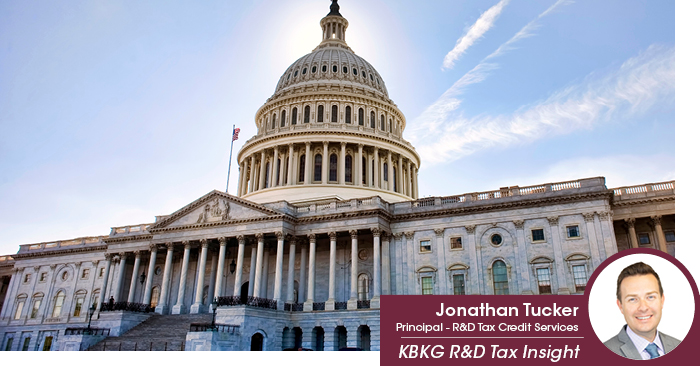By Jonathan Tucker | Principal, Research & Development Tax Credits
Republicans are slated to take control of the legislative and executive branches this coming year, and shifts in fiscal policy will affect taxes, tariffs, and broader economic strategies.
KBKG Insight:
While there is excitement and talk around “tax cuts,” taxpayers should monitor this changing landscape, as there will be winners and losers when it comes to benefits and costs. Many may see their tax bills go down, while many others may see a significant increase. Taxpayers should rely on their trusted tax advisors for updates on how things may impact them. Becoming educated on the real proposals and not just the talking points or sound bites may give taxpayers the opportunity to lobby their Congress people for beneficial change before any changes become law.
Background
The most talked about tax topic is the Tax Cuts and Jobs Act (TCJA), which was signed into law in 2017 under the first Trump administration. Some of the provisions within the TCJA are permanent, such as the reduction of the corporate tax rate and capitalization of research and experimental expenditures (i.e., Internal Revenue Code (IRC) Section 174); however, many provisions are set to expire in 2025. It is anticipated Republicans will make many expiring provisions of the TCJA a priority, such as:
- Individual: Lowering rates for individual brackets, expanding the child tax credit, and increasing the standard deduction
- Pass-through business tax benefits: Extending deductions for pass-through businesses (IRC Section 199A), which primarily benefit small businesses
- Estate tax exemptions: Retain the higher estate tax exemption
The reason many areas of the TCJA are scheduled to expire is that it was passed using what is known as the reconciliation process. This process does not allow for a net loss of revenue in a 10-year budget window, otherwise known as deficit neutral. To pass a bill that would create a deficit, the Senate must overcome the 60-vote filibuster threshold, and the Senate Republican majority is well short of the 60 votes needed, so the same reconciliation process is likely to be used again to pass tax legislation. This can create many issues in the promise to “cut taxes” as there is a significant cost to not only extending the TCJA, but many of President-elect Trump’s proposals, and things must remain revenue/deficit neutral under reconciliation.
The cost of extending the TCJA as it stands would be anywhere from $4.5 trillion – $6.5 trillion, and this does not include a further reduction in the corporate tax rate from 21% to 15% as President-elect Trump has proposed. This also does not include adding back previously popular provisions that were legislated out as part of the TCJA, such as bonus depreciation, expensing of research and experimental expenditures, and lifting the SALT cap deduction. In addition, President-elect Trump promised on the campaign trail other tax cuts, such as no tax on tips, social security, overtime pay, income on Americans living abroad, or military and first responders (i.e., firefighters and police officers).
KBKG Insight:
While Republicans control both chambers of Congress, their majority in both is slim, and there are policy differences even within the Republican caucus. The sheer cost of all the tax cuts, the slim majority, and differences in policy priorities will make it extremely difficult to balance everything.
The other side of the equation is revenue-offsets or increases in taxes and reductions of tax benefits. President-elect Trump has discussed raising revenue from only one major source, tariffs. His proposals on the campaign trail include imposing a 10%-20% tariff on all imported goods and a 60% tariff on goods from China. Recently, he has proposed implementing tariffs of 25% on Canada and Mexico. For a reduction in tax benefits, President-elect Trump campaigned on repealing many provisions of the Inflation Reduction Act (IRA), a law signed by President Biden in 2022, and allowing the enhanced premium tax credit to expire for the Affordable Care Act (ACA). In addition, President-elect Trump has discussed cutting spending from other aspects of the government that has not been completely defined, but appears all areas are on the table except defense.
KBKG Insight:
The IRA has become increasingly popular, and analysis indicates that a substantial amount of the IRA benefits is flowing to Republican-held districts, which could make it hard for the Republican-controlled Congress to repeal these benefits.
Conclusion
The balancing act of making everything revenue neutral, along with competing interests, will make this process extremely difficult. In addition, the current lack of details makes it hard for taxpayers to plan. However, Republicans have stated they plan to assume tax reform when they first take office, so taxpayers should have a better idea as things take shape over the next year.
Action Items
Taxpayers should monitor the process closely and engage with it. Knowing what areas of the law could change will allow taxpayers to understand if their taxes will go down or if some of their benefits will go away. Taxpayers should remain in contact with their trusted tax advisors, such as KBKG, for updates and how things may impact them.
About the Author
Jonathan Tucker | Principal – Research & Development Tax Credits
Jonathan Tucker is based in Atlanta, GA, and has over 20 years of experience providing federal business tax advisory services, primarily in R&D tax credits, to clients in various industries including technology, manufacturing, transportation, healthcare, retail and consumer products, hospitality, media and entertainment, financial, and other professional services industries. Read More



